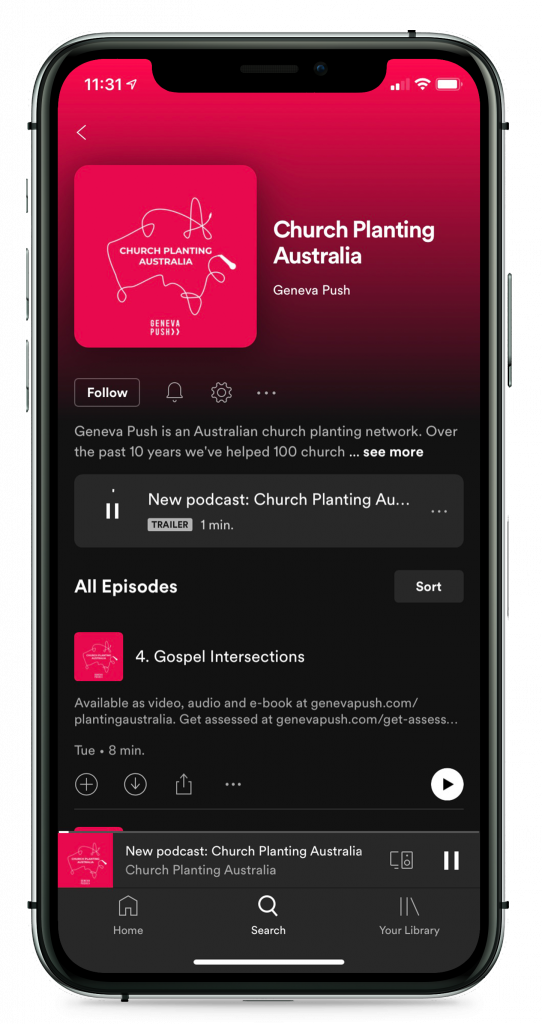Have you ever thought about starting a new church?
Listen to Church Planting Australia and find answers to all your questions about the who, where and how of planting healthy, growing and evangelistic churches across Australia.
Your hosts Derek Hanna and Madeleine Galea are from Geneva Push, an Australian church planting network that aims to see hundreds of new churches started across the country.

The Richard Johnson rule of church planting. Here’s 3 final tips inspired by Richard Johnson on building partners for your church plant.
How can we communicate with our church plant partners about what’s going on? How can we engage with those we are trying to reach? Should we be using social media at all? In this episode of the Church Planting Australia Podcast, we’re thinking about communications – social media, email, and more.
How do we recruit and build a united launch team for our specific planting model? Here are 6 principles to keep in mind.
Fundraising is awkward! But is it also a gospel opportunity? Today we look at 9 specific tips to raise financial partnership for our church plant.
Our key theological conviction is that our church plant is reliant on God. Here are 3 things to help keep prayer on the agenda.
Planting Information Nights – when should we run them? Who is our target audience? What information should we share? In today’s episode we discuss 4 steps to make the most of these nights to encourage partnership.
How do we invite people to partner with our church plant? Today’s episode helps us think through what Gospel Partnership is, and how to begin inviting others to join us.
1. Our greatest advertisement is our people.
2. Go for the low-hanging fruit first.
3. Build confidence.
4. Do the key things well.
5. There are some things we will have to undo.
6. Begin with a teams and multiplication mindset.
Having worked through the funnel, started to grapple with our church’s ecosystem, and considered how we mobilise our church for our vision, it’s time to start to identify the plumbing to go along with the poetry.
Under God, what can we do to best set up our church plant to win people to faith?
Looking at the mission funnel, we’re thinking about helping people make the journey from being contacts at church to being connected to Christians and Christianity.
How will your church plant make new contacts in the community? Ideally, you can become known as ‘the church I know I don’t go to’. This episode points to four ways to make contacts:
1) The personal contact of your launch team.
2) The ‘new front door’.
3) Community leaders and existing groups in the community.
4) Special events.
Help your launch team to grow in conviction, competence and confidence for mission.
Are you thinking about your plumbing in terms of an ecosystem? Are you providing pathways for your whole church to be matured together as they engage in mission?
One of the helpful images that’s become popular over the past few years in church life is “Poetry and Plumbing”. Poetry is the biblical vision casting and stories that inspire the imagination and draw people in. Plumbing is the mechanics, structures and processes that help people partner in what the church is doing to achieve that vision.
“What do we value that is specific to our church and our context?” Another way of looking at this set of values is to ask the question “How do we do things around here?”
What we’re trying to capture and express here is what the Bible is calling us to lead our churches, and those God has given us to shepherd, towards. Who is God shaping us to be, both individually and corporately? Another way of asking this question would be “what do we want our people to become?”
If you were to sit down with a Bible and your launch team and answer the question “We want to be a people and a community that…”, what would you come up with?
The point of your vision is not to be written on your strategic plan and then stuck in a drawer. So as you’re considering the vision for your church through the lens of the previous four principles, it’s helpful to consider how you package it.
Where is God taking us? If you’re in a multisite context, this vision will be drawn somewhat contextualised for the campus you’re planting. For all other planting models, you will have much more freedom to start from scratch, but that doesn’t mean you need to start from scratch.
In this section, we’re grappling with the question of “What does this church exist for?”.
There are a number of different ways that people express vision, mission and values, but we’re trying to drive towards biblical simplicity, and not over-engineer it.
Contextualisation is about holding firm to God’s teaching, while clearing all non-Gospel roadblocks so that people can encounter Jesus. This will shape our language, our gatherings, our teaching and our systems. Everything we do will be run through the lens of the Gospel and applied to the context we’re trying to reach.
In this single question, there are two questions: one about people group and one about geography. Some church planters have a people group in mind and then work out the best place to locate themselves. Others will have an area in mind and then identify the people who live there.
“If you can plant a church, you should plant a church.” On the one hand, that’s an exaggerated statement that requires a number of caveats. On the other hand, people need Jesus, church plants reach new people and more people could church plant than may be willing to admit.
Every church began as a church plant, but with so many established churches across Australia – many of whom don’t have full-time pastors – do we really need more?